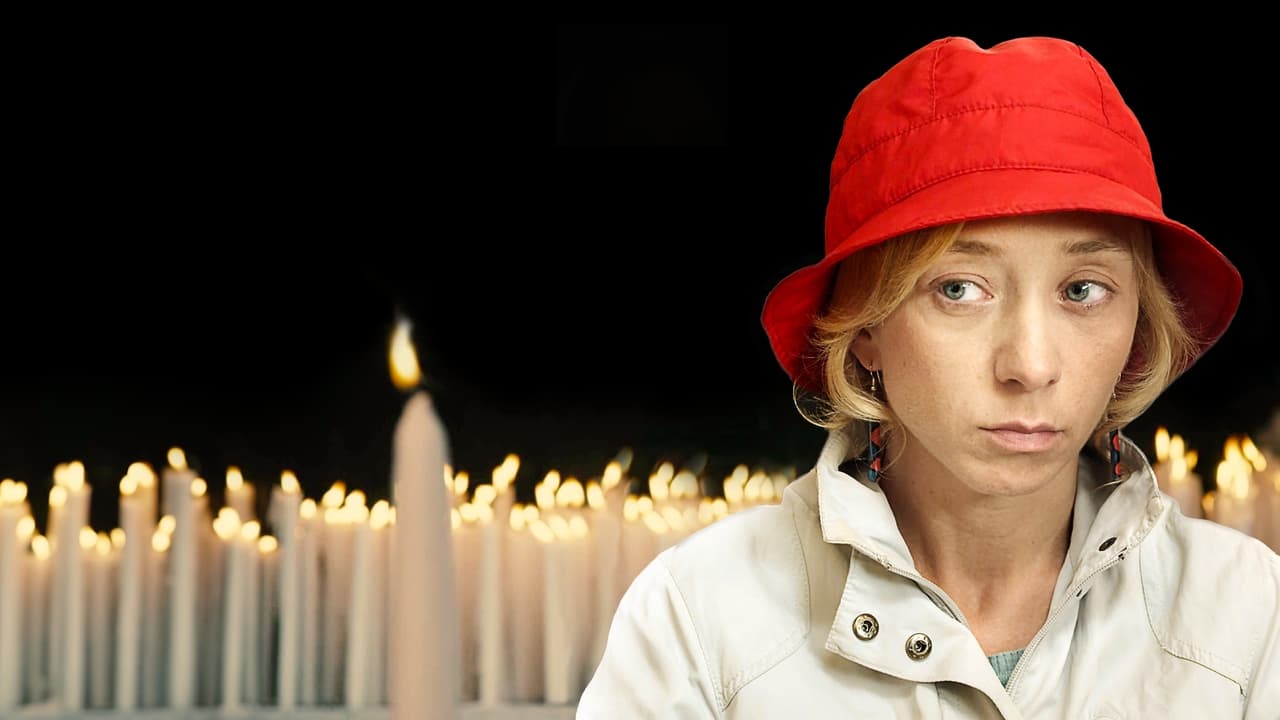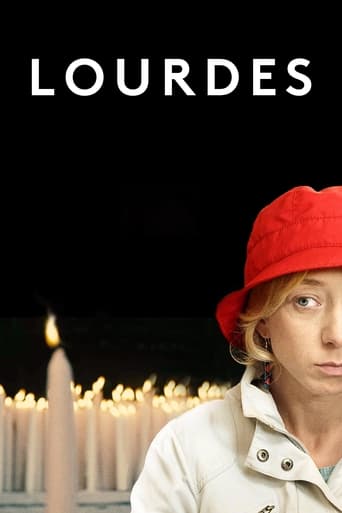Supelice
Dreadfully Boring
Reptileenbu
Did you people see the same film I saw?
DipitySkillful
an ambitious but ultimately ineffective debut endeavor.
Myron Clemons
A film of deceptively outspoken contemporary relevance, this is cinema at its most alert, alarming and alive.
bbrooks94
Borderline masterpiece. Beautiful film about, you guessed it, Lourdes (a small market town in the Pyrenees where a number of supposedly 'mystical' healings have occurred.) More specifically, it follows the story of Christine, a wheel chair using woman with multiple sclerosis and a number of others who hope to be healed. It is a very moving piece of cinema and can be interpreted in two ways. One, religious, the other, sceptical. I prefer the latter explanation, but the film's true intentions are not exactly clear. Either way, the film illustrates hypocrisy and masked cruelty of Catholicism in a subtle and beautiful way. Having said that, there is a mystical, almost haunting, air to the film. The quiet, echoing organ music that plays repeatedly throughout further enhances this feeling.
jodro
This is a dreadful film. If it had been made in the 1960s, criticising the petty-mindedness of the bourgeoisie and the blame-the-victim attitude of Christianity, it would have been a fairly mediocre but worthwhile and important effort. But it was made in 2009, and the world has moved on, in some respects at least. I live a couple of hours from Lourdes, and people here in France simply don't talk and act as repressed (any more) as they do in the movie. The dialogue was incredibly stilted and full of clichés, as were the characterisations. Some people write that the movie comments on life and religion on many subtle ways. Other than showcasing, once again, the cruelty and incompetence of the Christian mindset towards those that suffer, I didn't see any deep meanings, subtlety or anything illuminating making it worthwhile sitting through all this. I mean, do we really have to listen, again, to people discussing that hoary old chestnut, of how God can be all powerful and all good, yet allows suffering in the world? Or the man walking away from the girl after she falls, how much more clichéd can you get? The film clearly is made with honesty and integrity, but sadly with a great lack of originality. It looks as if Hausner tried to make a film in the tradition of social realism, which is fair enough, but it's far inferior to many other movies in the genre, and her approach really is forty years out of date.
Thistle-3
I am Roman Catholic. Lourdes is a blessed, mystical place. I hear. The story goes, the Virgin Mary appeared to St. Bernadette in a grotto near Lourdes several times. Word spread, a shrine was built, miracles occurred, all in this small community in the south of France. Now, millions travel to Lourdes every year, looking for intervention from St. Bernadette and the Blessed Mother. While I've never been there, I have been to shrines, like Saint Joseph's Oratory of Mount-Royal in Montreal. The relics for sale and presence of the pilgrims are a little scary, but there was no denying the power of the place. So, I was very interested to see a pilgrimage from the perspective of a pilgrim in Lourdes, a movie playing at the Cleveland International Film Festival, this week. Christine is a young woman from France who has multiple sclerosis. She's lost control of her body from the neck down. But, her mind is vibrant, she seems to accept the help of nurse volunteers at Lourdes with a pleasant demeanor. She tells a priest, in confession, that she gets angry over her diagnosis and feels envious of able bodied people, like a nurse who is flirting with a man on the trip that she fancies. This is like a group tour, with a different activity each day: a hike through the grotto, a bath in the water, even an award at the end of the trip for the "Best Pilgrim." Christine's mother is with her on the trip. Their relationship is one of the things that bothered me in the movie. While her mother accepts the role of caregiver, they barely talk or interact, except in a very distant fashion. I didn't get that. A couple of the older volunteers hang together at night and discuss deep topics of faith and spirituality. Juxtapose that with Christine confessing to her nurse that she is not really a believer, she just goes on the pilgrimages because she can't really get out of the house for much else. When the inevitable miracle occurs, within the group, some are jealous, others are skeptical, others just wonder why some are chosen and others are not. Lourdes is a very quiet, very slow moving film. I guess I was hoping for more of an epiphany, but at the end, I wasn't at all sure what I was supposed to take away from it. I was interested but not satisfied. I give Lourdes a 7 out of 10.
Cliff Hanley
Surrounded as we are with noisy and highly coloured new films, not least Avatar, it comes either as a balm or an intense irritant to see one like Lourdes, depending on your attention span.Not surprisingly, this is set in the major pilgrim attraction of Lourdes, and as it opens to the strains of the most beautiful song ever written, Ave Maria of course, with nurses helping disabled and elderly pilgrims to their dining tables, you can guess there isn't going to be much rock'n'roll in this.Christine, the central character, is wheelchair-bound due to multiple sclerosis. She is on the trip with a church group although she isn't all that sold on religion. She shares a room with another woman, who may be her long-time carer or just another traveller. Early in the visit she has a mysterious half-conversation with the handsome uniformed alpha male. Several other sub-plots are hinted at through fleeting glimpses of the action.Christine apparently becomes one of the lucky few to enjoy a miracle cure at Lourdes, which is the turning point for all within range including the officer, the inept priest, her room-mate and a couple of fellow travellers whose attitudes become less than charitable.The story is told through Christine's face much of the time, and could almost work as a silent film. It inevitably has touches of satire, given the setting, but it's cloaked in so much ambiguity that it resembles a David Lynch work. According to my friend, the theme must be the interplay between substance and appearance(both in themselves Catholic obsessions); the difficulty in finding a literal absolute in either, being echoed in the ending. If you can see Lynch's Mulholland Drive as black coffee, this is the Earl Grey tea.And whatever your poison is, you will have a lot to talk, even argue, about after the Lourdes experience.

